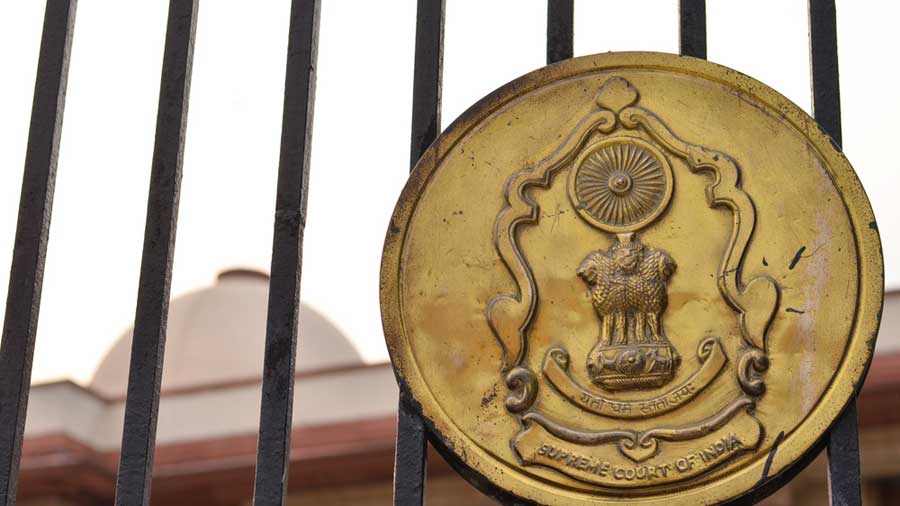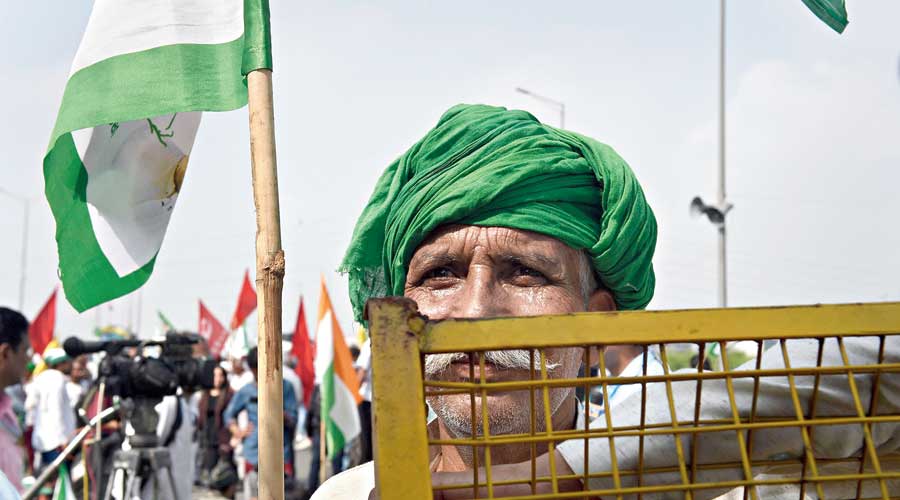The Supreme Court on Friday said the 10-month-old farmer protests on Delhi’s borders had “strangulated” the city, a day after another bench had expressed concern at the continuing blockade of highways leading to the capital.
Friday’s remark came on a joint petition from the Kisan Mahapanchayat, a farmers’ organisation, and its president Ram Pal Jat challenging Delhi police’s refusal to allow them to agitate peacefully on the designated protest site of Jantar Mantar Road.
“On one hand you’ve strangulated the entire city and now you want to come inside and protest?” Justice A.M. Khanwilkar, who headed the two-judge bench that included Justice C.T. Ravi Kumar, asked the petitioners’ counsel Ajay Chaudhary.
When Chaudhary said his client was not part of the protests on Delhi’s borders, the bench directed the Kisan Mahapanchayat to state this in an affidavit.
The protests on Delhi’s borders, which began on November 26 last year, are being spearheaded by the Samyukta Kisan Morcha, an umbrella organisation of over 40 farmer bodies. Many farmers’ organisations are against any judicial settlement and want the Centre to repeal the three new farm laws, which they say would leave them to be exploited by big companies.
On Thursday, the bench of Justices Sanjay Kishan Kaul and M.M. Sundresh had told the Centre: “Redress can be through a judicial forum, agitation or parliamentary debates, but how can highways be blocked perpetually? Where is the end?”
The bench made the oral observation on a Noida resident’s plea seeking removal of the roadblocks, and asked the Centre to implead the various associations of the agitating farmers.
On Friday, the bench of Justices Khanwilkar and Ravi Kumar wondered why farmers should continue agitating after having approached the apex court challenging the three laws’ constitutionality.
“There is no purpose of protest once you approach the court. There is no purpose to approach the court when you want to protest,” the bench said.
The bench said: “If you approach the court, you will have to trust the court. Why don’t you approach the (Delhi) high court?”
It added: “You have a right to protest, but you cannot destroy property. This business should stop. You are also heckling the security and defence personnel. This business has to stop.”
Chaudhary said the highways had been blocked by the police, who had detained farmers.
The petitioners have argued that the police’s refusal to let them hold “peaceful, unarmed and non-violent satyagrah” at Jantar Mantar violates “Article 14 (equality), 19 (freedom of speech) and 21 (right to life and personal liberty)”.
The court directed Chaudhary to serve copies of the joint petition to the attorney-general and the Centre, and posted the next hearing to Monday.
Earlier, a bench of Justices Kaul and Hrishikesh Roy had directed the Centre and the Haryana and Uttar Pradesh governments to ensure the farmers’ highway sit-ins did not inconvenience ordinary travellers.
In January, a bench headed by then Chief Justice of India S.A. Bobde had stayed the three controversial farm laws and set up a four-member committee, ostensibly to broker peace between the Centre and the agitating farmers.
That order came on a clutch of petitions filed by farmers, other individuals and NGOs challenging the three laws’ constitutionality.
But the farmers refused to interact with the committee, saying some of its members were part of the pro-legislation lobby. The panel members were Ashok Gulati, agricultural economist; Pramod Kumar Joshi, former South Asia director of the International Food Policy Research Institute; Anil Ghanwat, president of the Shetkari Sanghatana; and Bhupinder Singh Mann, chairperson of the All India Kisan Coordination Committee.












